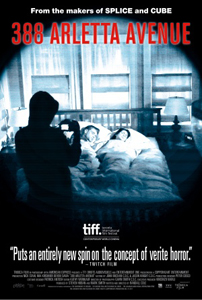
An interesting concept, that loses a bit in the execution. Described by many critics—incorrectly—as a “found footage” pic, it can be more accurately said that the movie uses the device of surveillance video for much of the proceedings. While the pace is a bit slow for my taste, the final reveal makes it all worthwhile.
As the pic opens, James (Nick Stahl) and his wife Amy (Mia Kirshner) are being observed via a number of hidden cameras, the first one located in the car of the perp, parked across from their house—located at the eponymous address. One of the things observed is that James carelessly leaves his house key in a front porch planter. As such, the stalker gains access to the house, and installs many more cameras.
We find that relations between the couple are not the greatest, in that a compilation CD placed in James’ car (obviously by the stalker) leads to a big argument. The tension could be related to James having had an affair with a woman at his office, although this is not well-established. Then again, why else would Amy’s sister Katherine (Krista Bridges) hate him so much?
Soon after, Amy is gone, and a note appears on their kitchen table explaining that she had to get away for awhile. Trouble is, “awhile” turns into way too long, and all attempts to reach her fail. Not surprisingly, Katherine suspects that James did something to her. Meanwhile, James is desperately trying to solve the mysteries of his wife’s disappearance and the identity of the stalker, who is now making himself quite apparent by his actions—which include killing James’ cat.
A clever turn involves Bill (Devon Sawa), a former classmate that James bullied. Under the notion of Karma’s a bitch, he suspects that Bill is the perp. By the time the police investigate these matters in earnest, it may be too late.
***SPOILERS AND OTHER COMMENTS***
The identity of the perp is not nearly as important as why he is doing the stalking, and that I won’t reveal.
One theme here is how little it takes to drive someone nuts— a concept that goes back in the movies at least to Gaslight (1944).
Despite what he’s going through, little sympathy is created for James, suggesting that he has done far worse than has been hinted at, and deserves his situation. But what about the collateral damage?
Even though cameras are deployed all over the house, there is absolutely no sexual voyeurism. Our perp is after something much bigger—and much darker.

